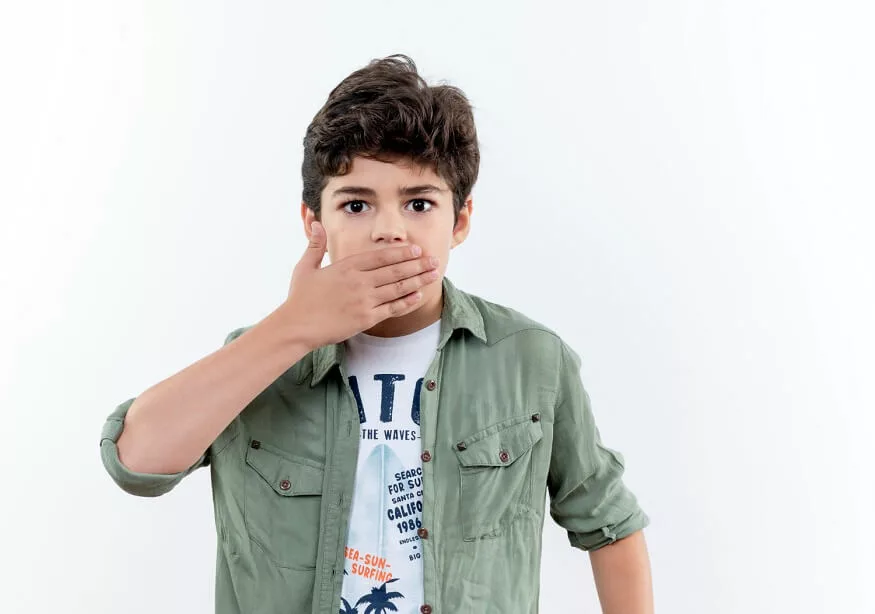As a parent, nothing compares to the joy of seeing your toddler’s bright smile light up a room. However, when that sweet smile is accompanied by not-so-sweet breath, it can raise concerns and leave you wondering about the causes and solutions for toddler bad breath. In this comprehensive guide, we’ll explore the common reasons behind bad breath in toddlers, dispel myths surrounding the issue, and provide practical tips on how to tackle and prevent unpleasant odours. Let’s delve into the world of toddler bad breath and find effective solutions for ensuring your little one’s oral health is as radiant as their smile.
Understanding Toddler Bad Breath
Explore the nuances of toddler bad breath in this insightful guide. Uncover common causes, preventive measures, and tips for maintaining your little one’s oral hygiene with care.
1. Common Causes:
Toddler bad breath, also known as halitosis, can be attributed to various factors, some of which are perfectly normal. These include:
- Dry Mouth:
- Dietary Habits:
- Poor Oral Hygiene:
- Respiratory Infections:
- Teething:
Toddlers may experience dry mouth during sleep or due to breathing through their mouths, leading to a decrease in saliva production.
Certain foods, such as garlic, onions, and strong spices, can contribute to temporary bad breath.
Insufficient brushing and flossing can allow bacteria to accumulate in the mouth, leading to bad breath.
Cold or sinus infections may cause postnasal drip, contributing to bad breath.
The teething process can lead to increased saliva production, causing temporary bad breath.
2. Myths and Misconceptions:
Before diving into solutions, it’s crucial to dispel some common myths about toddler bad breath:
- Breath Mints and Gum:
- Ignoring the Issue:
- Brushing:
- Flossing:
- Encourage Water Intake:
- Limit Strong Flavours:
- Crunchy Fruits and Vegetables:
- Early Dental Visits:
- Teething Toys:
- Consult a Healthcare Professional:
- Gentle Tongue Cleaning:
- Limit Sugary Beverages:
- Lead by Example:
- Be Vigilant:
These are not suitable for toddlers due to the risk of choking. Focus on safer alternatives.
Assuming bad breath is a passing phase can lead to potential oral health issues. It’s essential to address the root cause.
Also Read: Guide to Braces for Kids – Dental health for kids with braces
Solutions to Toddler Bad Breath
Discover effective solutions to tackle toddler bad breath. Explore practical tips and habits to ensure your little one’s oral health is maintained optimally.
1. Establish a Consistent Oral Care Routine
Use a soft-bristled toothbrush and a tiny amount of fluoride toothpaste to gently brush your toddler’s teeth twice a day. Make it a fun and engaging activity to encourage cooperation.
Begin flossing as soon as your toddler has two teeth that touch. Flossing helps remove plaque and food particles between teeth.
2. Hydration is Key
Ensure your toddler stays well-hydrated throughout the day. Adequate water consumption helps maintain saliva production, which is essential for oral health.
3. Balanced Diet
While a varied diet is crucial for overall health, limiting strong-flavoured foods can help reduce temporary bad breath. Opt for milder alternatives.
Incorporate crunchy fruits and vegetables like apples and carrots, which can help clean the teeth naturally.
4. Regular Dental Check-ups
Schedule your toddler’s first dental appointment by their first birthday or as soon as their first tooth emerges. Regular dental check-ups can detect and address any emerging issues.
5. Teething Management
Provide safe teething toys for your toddler to chew on. This not only helps soothe discomfort but also increases saliva flow, reducing dry mouth.
6. Address Respiratory Issues
If your toddler has persistent bad breath accompanied by symptoms like coughing or nasal congestion, consult a healthcare professional to address potential respiratory issues.
7. Tongue Cleaning
Use a soft toothbrush or tongue scraper to gently clean your toddler’s tongue. Bacteria can accumulate on the tongue’s surface, contributing to bad breath.
8. Avoid Sugar-laden Drinks
Avoid sugary drinks, as they can contribute to tooth decay and potentially lead to bad breath. Stick to water as the primary beverage.
9. Model Good Oral Hygiene
Demonstrate good oral hygiene habits by brushing and flossing your own teeth. Children often mimic their parents, making it an excellent opportunity for positive reinforcement.
10. Watch for Signs of Tooth Decay
Keep an eye out for signs of tooth decay, such as discoloured spots on the teeth. Early intervention is crucial in preventing dental issues.
Also Read: Personal Grooming for Kids: Importance, Tips, Benefits
Tips for a Positive Oral Care Experience
- Turn oral care into a positive and enjoyable experience. Use colourful toothbrushes and incorporate songs or games to make brushing time engaging.
- Select toothbrushes and toothpaste designed specifically for toddlers. The right tools can make the oral care routine more comfortable and enjoyable.
- Praise your toddler for their efforts in maintaining good oral hygiene. Positive reinforcement creates a positive association with oral care.
- Consider visiting a paediatric dentist who specializes in treating children. They can offer tailored advice and create a child-friendly environment.
- As your toddler grows, teach them proper brushing and flossing techniques. Instilling good habits early sets the foundation for lifelong oral health.
1.Make It Fun
2. Choose Age-Appropriate Products
3. Positive Reinforcement
4. Visit a Paediatric Dentist
5. Teach Proper Techniques
When to Seek Professional Advice
While occasional bad breath is normal, persistent or severe bad breath may warrant professional attention. Consider consulting a paediatric dentist or healthcare professional if:
- Bad breath persists despite good oral hygiene practices.
- There are signs of tooth decay or oral health issues.
- Your toddler experiences pain or discomfort while eating or brushing.
- There are accompanying symptoms such as fever or nasal congestion.
Also Read: Childhood Dental Health and Nutrition: Foods that protect and harm young teeth
Understanding and addressing toddler bad breath is a crucial aspect of ensuring your child’s overall well-being. By establishing a consistent oral care routine, encouraging healthy habits, and addressing potential underlying causes, parents can play a pivotal role in fostering excellent oral health for their toddlers. Remember that positive reinforcement, a gentle approach, and regular dental check-ups contribute to a positive oral care experience. So, embark on this oral health journey with your toddler, share the joy of healthy smiles, and watch as their confidence grows along with their radiant grins. For more blogs on babies, toddlers, infant and child development, read EuroSchool.










